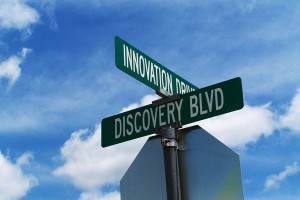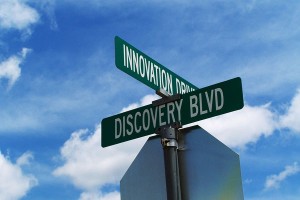
The Spirit of Discovery.
I am nearly breathless after trying to describe innovation in my previous lesson. I want to now take a look into the spirit of discovery. So, keeping it old school, Webster says that discovery is “The act of finding or learning something for the first time!
My heart beats faster just after reading that definition. You’ve read the headlines; “Her research led to many important discoveries. Reporters discovered that the Governor had been unfaithful to his wife. We discovered a talented musician. A voyage of discovery. It was one of the most important discoveries in the history of _____________!”
Discovery! Think of Lewis and Clark and their expedition of discovery. It required teamwork. It required admitting that they had no clue what they would encounter. Discovery has a knack for showing all involved that they are not in control. Discovery forces all involved to admit this phrase; “I don’t know!” Therefore, discovery creates humility.
Here’s what excites me about the critical difference between innovation and discovery. I wrote earlier that innovation breeds arrogance; it has to exist already to breed arrogance. What’s thrilling about the act of discovery is that it creates humility. An arrogant person thrust into an environment of discovery can become humble. Humility is born in uncertainty and danger. Opening yourself or your organization to uncertainty and risk creates humility. Discovery creates humility which causes all involved to rely on each other humbly and usefully.
Innovators command their teams to do as told. Innovation companies rely heavily on their policy manuals to police one another, and it breeds untrusting groups inside riskless environments. Please understand me; there is a need for policy. The attitude difference behind the policy is night and day different amongst innovative and discovery-type companies. It’s the difference between arrogance and humility. Discoverers have to rely on and trust each other. Which team would you prefer to work on? Don’t forget that Innovation and Discovery are both good. I like the discovery mentality and the bias you read in this article.
An example is from the book “Good to Great” written by author Jim Collins. In his book, Collins differentiates between Levels 1,2,3,4, and 5 leaders. Jim Collins talks about how level 4 and level 5 leaders can produce similar results, but a critical difference between a level 4 leader and a level 5 leader is humility or lack thereof. Level 5 leaders always lead through humility. Level 5 leaders tend to lead companies with a reputation for being discovery oriented.
Many companies are known for being a company of discovery, and their leaders seem arrogant. Maybe a fine example would be Steve Jobs and Apple Inc. Steve Jobs carried a reputation for being arrogant. However, I think there are some nuanced differences between arrogance, confidence, and ego. Often all of those traits are shrugged off as arrogance, requiring discernment to know the subtle differences. The differences are known by how much character is evident in a person. The difference between arrogance and confidence is not discovered by measuring their ego but by their character. The ego is a good thing when the measure of character in a person is as high as the measure of ego. However, a high ego and low character are the chemistry of an arrogant person.
How does one transform an arrogant innovator into a humble discoverer? An excellent example of creating humility through discovery would be forcing an innovative person who struggles with arrogance in the front of the boat as you White Water Raft a raging river. This control-type person and his arrogance wash away (in this case, maybe literally washes away) into humility as everybody else in the raft hears him scream like a child. HUMILITY SERVED!
That is what I love about discovery. It is teachable. Innovation is contagious, and discovery is teachable.
Discovery is the mentality that focuses only on causes and even invests fully in a cause regardless of the effect or the result. I said earlier that I am a pastor. So if I study the life of Jesus, I can see He was a man who even knew the result or the effect of His life. He was going to be badly beaten and murdered. Yet he stayed with the cause. By cause, I mean the foundation, the reason, the why we are pursuing a goal instead of forcing a specific result. Innovators push results, and discoverers focus on a cause and trust the results to manifest. In the people business, like ministry, the outcome/result/effect is God’s job, not mine. My job is to focus on the cause regardless of the effect or result. In the Lewis and Clark discovery expeditions, they couldn’t control any outcomes or results. Every step could have been their end. They had to live in the moment and keep discovering new things around every corner, river, crevice, predator, and tree. The results took care of themselves and were remarkable.
Innovation focuses on the outcome and effects…the end result.
Discovery focuses on the cause and behavior while pursuing a cause.
Innovation measures results.
Discovery measures faithfulness to the cause.
One is motivated by control, and one is motivated by love for the cause. One is living for the future at the cost of the present, and one is loving the present and leaving the results in God’s hands.
It’s scary and breeds humility to leave the results in the hands of God. I think leaving things in the hands of God is the safest risk you could ever take. In the Big Picture of life, the most important things are not at the end of the journey; what develops and shapes along the journey makes champions and usually creates an end product more remarkable than an innovator. If a climber of Mount Everest only focuses on the end result of attaining the top of the mountain, then what happens once the pinnacle is reached? (Many Everest Climbers have witnessed people who only focused on the result and forgot to focus on their next step, resulting in a fall to their death.) Also, once the climbers of Mt. Everest achieved the result of getting to the top of the mountain, those who only focused on the result struggled with depression soon after. The journey, the cause, is where fulfillment is found. Living for a cause is unending, leading to more discoveries. Achieving a final innovative result requires more critical thinking to start another innovative process that stimulates a vicious circle of arrogance.
Discovery is all about the mentality of facilitating the purpose and progress of others. Discovery is exhilarating along the way because of the thrilling unknown yet to be discovered, but it is not about you. It has to be about others. Discovery mixed with selfishness kills people. In its purest form, discovery is about team and trust, and reliance on the critical factor that everybody has each other’s interests above their own as they risk together on a path toward discovery.
Discovery admits that the behavior never changes, but the answers and results do. So a person of discovery never has the solutions for tomorrow and only has their behavior to control.
Jesus taught that people shouldn’t worry about tomorrow for today has enough problems. (Matthew 6:34)
People with the Spirit of Discovery keep asking, “How should I treat this person right here, right now?” How should I behave as I proceed into this business meeting?” “How can I focus my attitude to deal with this next situation that will impact my company?” “In this current conflict, how can I respond to this person to show that I care about them, even if our conflict results in separation?”
Discovery lives for the cause regardless of the effects/results.
Discovery focuses on the cause, not the effect. It focuses on the journey, not the results.
Innovation forces an outcome and controls and measures results over and over and over. Discovery measures behavior and leaves the outcome up to God. Discovery measures, but it measures very different things when compared to an innovator. Discovery is the best business model.
Hopefully, you are thinking right now, “I want to be a leader of Discovery!”
The attitude of discovery has no silo groups individually working toward some result. Discovery breaks down the walls of separation and verifies the need for each other. Innovation creates hierarchies and power pyramids that police each other. Innovative bosses control and measure according to a predetermined result they strive to achieve at all costs. Bosses and leaders are very different. Discovery creates circles full of people who honor and trust each other’s strengths for survival and discovering the result. Discovery teams are silo-less circles with a leader that does not have a Boss mentality. Oh, please don’t mistake me, the buck must stop somewhere, but the buck stops with the one who is the true leader. A true leader naturally facilitates the purpose and progress of all the others in the circle, even willing to lay down his life for them.
There is no “Boss” in the circle of discovery. Why? Because when you are out discovering and the “boss” finds himself in Quick Sand and about to die, his boss mode transforms into humility. He might just be left to die depending on how he treated his “underlings,” and it all gets covered up as a tragic accident! I don’t want to be a boss with everybody licking my boots out of fear. I want to be a leader who discovers with my team while keeping other people’s best interests ahead of mine. That’s discovery. That’s a level 5 leader.
The spirit of discovery’s primary focus is not on the organization’s end goals but on the environment inside the organization that leads to great team discoveries.
A discovery team maintains focus on the cause and the organization’s culture; then, the organization will grow as a result. Focus on the cause, not the result! A result that happens out of fear, control, and force is not a result that gets celebrated, except for a bonus check at the end of the year. The next generation of leaders is not motivated by bonus checks but by discovery relational teamwork.
How does a discovery-type leader grow?
A discovery-type leader rarely, if ever, looks into their field type for how to do it better; that is what innovators do. When a company of discovery quits its attitude toward discovery, it becomes innovative. A discovery company knows its competition is a company in a different field of interest, and its worst competition is itself. I love the slogan on Michael Jordan’s web page. “The only man who could stop Michael Jordan….Is Michael Jordan!” That is true of your company, church, family, and yourself. When a company of discovery finally feels like it has arrived and has the best idea, it has now transformed into a company of innovation.
A company of discovery is full of observation towers instead of silos. It studies and learns (discovery) from its customer but is full of interaction with others outside its own company. A company of discovery never polls its own, only interacts. You can’t poll something yet to be discovered, so the company of discovery is full of trial and error. It has a culture of permissible failures followed by grace. How many times did Abe Lincoln fail? How many times did Albert Einstein fail? With unknowns around every corner, discovery keeps you and the team humble. It has a great sense of humor and often laughs at itself. It has a mentality of meshing and sharing with others. It trusts every individual in the company to utilize and expand on their expertise and strengths. Team and trust are a must in Discovery Companies. The company of discovery has an attitude of servanthood and adventure and considers others better than the self. Obviously, I have a bias towards the discovery company and carry a bit of displeasure towards companies of innovation. That’s my problem, that I will have to deal with. My simple question is, which company do you want to be a part of? Here’s what is remarkable about companies of discovery. They never end. They continue to discover and adapt and evolve into the future. Companies of innovation sooner or later celebrate how they achieved their final result; they nailed their ultimate goal! Hip-Hip Hooray, Hip-Hip Hooray. Then what? These are the companies people talk about when they think back at what used to be. They usually last one lifetime, measured by three generations. Again, not bad, not wrong; Just not where I want to leave a mark on history.
So which of these two is the company you work in or lead?
Innovative? Then you have good news; you can develop your spirit of discovery and be remarkable. It’s time to get your team together and go where no man has before. It’s scary! It creates humility. Are you up for it?
Discovery? Then stand guard, for it is easy to start coasting, which can only happen on a downward slope. The instant you think you have arrived, you have transformed into innovation, but that is okay because you can decide to discover once again!
I hope you will discover who you are.
I hope you will discover what could change the world and make it better.
I hope you will discover the freedom of working humbly with a team.
I hope you will discover that the greatest joy in life is helping others achieve their dreams and desires.
When you discover that, you will be living your dream.
The journey will be unbelievable.
I’d love to hear your thoughts and pushback. I by no means am an expert in this. I am simply thinking out loud. I like to think it all makes sense, but I’m sure there are gaps. I’m still discovering what works for me, and it’s a thrilling and humbling adventure.
Go Discover!






